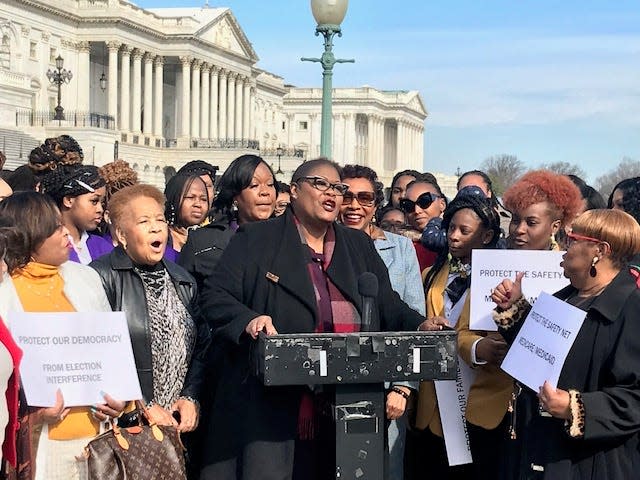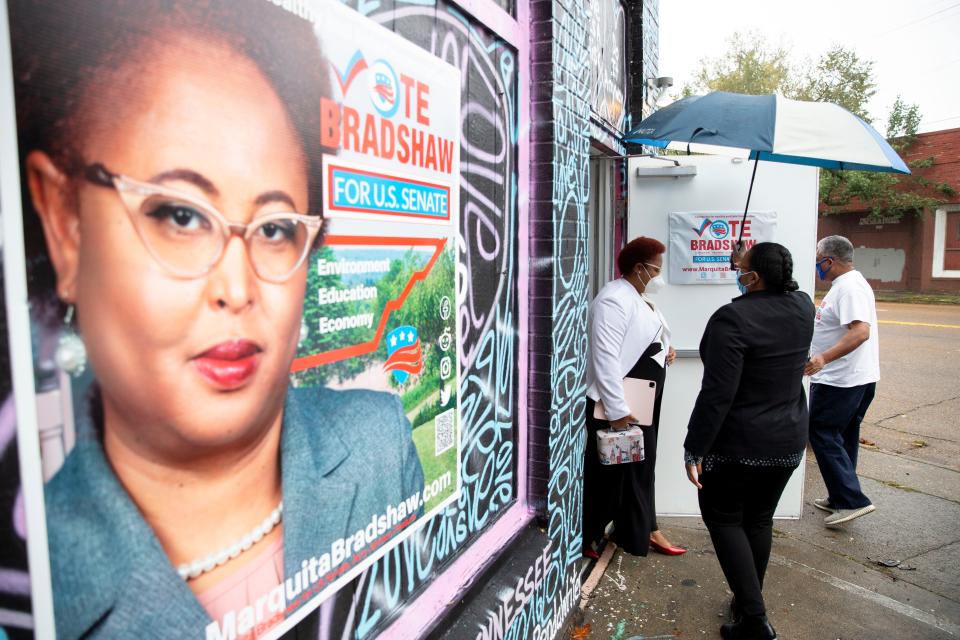Lack of party support and money, plus racism and sexism, mean Black women often lose statewide elections

In 2017, more than 30 prominent African American women wrote an open letter to then-Democratic National Committee Chairman Tom Perez, calling out the party for taking Black women’s political activism and leadership for granted.
“We have shown how Black women lead, yet the Party’s leadership from Washington to the state parties have few or no Black women in leadership," the letter said. "More and more, Black women are running for office and winning elections – with scant support from Democratic Party infrastructure."
More than four years since the letter was written, Atlanta Mayor Keisha Lance Bottoms is now the Democratic National Committee’s vice chair of civic engagement and voter protection. Kamala Harris is the nation’s the first Black woman and the first South Asian woman to be vice president.
Despite these gains, Black women continue to be underrepresented in statewide offices across the nation. In Virginia’s recent Democratic primary for governor, neither of the two Black women running won the race. (Virginia has also never elected a Black woman to Congress.)
It has been more than 50 years since Shirley Chisholm – the first Black woman elected to Congress and the first woman to be a major party candidate for U.S. president – ran for office. Black women continue to face the same challenges with which Chisholm struggled. Chief among them are a lack of institutional support, a lack of access to money, and the combined forces of racism and sexism.
More: Unbought and unbossed: Shirley Chisholm blazed multiple trails
The difficulties Black women face running
During Virginia's Democratic primary race, two Black women were vying for the nomination – former Del. Jennifer Carroll Foy and state Sen. Jennifer McClellan. Their loss to former Gov. Terry McAuliffe – who was the front-runner in the race and outraised both candidates – is the latest example of the difficult path Black women running for statewide office across the nation face.
McAuliffe raised $12 million, more than double the almost $4 million raised by Carroll Foy and the almost $2 million McClellan raised. McAuliffe won with more than 60% of the vote. Carroll Foy finished second with about 20% of the vote. McClellan finished in third place with about 11% of the vote.
Nadia E. Brown, an associate professor of political science and African American studies at Purdue University, said a focus group with Black women candidates in Texas illustrated the frustrations they felt.
Brown said some women talked about the discrepancies in fundraising and why they wished the Democratic Party would get involved in the primaries, particularly in races where a win in the primary almost guarantees a win in the general election.
“Black women overwhelmingly vote for the Democratic Party. So, the Democratic Party doesn't have the incentive to outreach and do the work of cultivating candidates and leaders, the same way it does for other groups,” said Brown, who also wrote the book "Sisters in the Statehouse: Black Women and Legislative Decision Making."
“There are stories upon stories like this I've heard from candidates that I've spoken with. They're just really angry at feeling taken for granted by the Democratic Party."
Organizations like Emily's List, which works to elect Democratic women who support abortion rights, and Higher Heights, which helps elect Black women and mobilizes Black female voters, have supported Black women running for office.
In the Virginia race, Carroll Foy was endorsed both by Higher Heights and Emily's List, and McClellan was endorsed by NARAL Pro-Choice Virginia PAC and Women of Color Coalition, a grassroots political organization.
“Part of why Emily's List was founded back in the ‘80s was because the Democratic Party institutions were hesitant to get behind women running for office because they didn't think that could win,” said Emily’s List spokesperson Kristen Hernandez.
“Our whole purpose is taking some of those quote-unquote risks on candidates that might not typically be seen as a winning choice by more traditional institutions."
Black women are loyal Democratic voters
Black women have consistently voted for Democratic candidates and in higher proportions than many other groups. They are also the Democrats most loyal voting bloc.
According to voter analysis of the 2020 presidential election, Black women voted for President Joe Biden by a 93% margin, compared with 47% of white women who voted for Biden. During the 2016 presidential election, Black women voted for Democratic nominee by a 94% margin.
“In the 2020 election, women across the board really continued to outvote men in terms of a proportion of the women who voted and in raw numbers, as well. That was true across all different races and ethnicities,” said Claire Gothreau, research associate for the Center of American Women in Politics. “But Black women, in particular, we saw a pretty significant uptick in turnout in 2020.”
The only group of women who voted at a higher proportion than Black women were white women, Gothreau said.
“Across different racial and ethnic groups, Black women are sort of approaching the turnout levels of white women, which is pretty notable to me because obviously white women don't face the same sort of systemic barriers to voting” Gothreau added.
The US Senate, in particular, needs Black women members
A record number of Black women served at the start at the 117th Congress, according to a joint report by Higher Heights Leadership Fund and the Center for American Women in Politics. All the Black women serving at the start of the 117th Congress – 26, plus two nonvoting delegates – are Democrats.
However, Rep. Marcia Fudge, D-Ohio, was tapped by Biden as his Secretary of Housing and Urban Development. And with then-California Sen. Harris’ ascension to vice president, the Senate is now left without any Black female representation. Harris was the second Black woman elected to the Senate. Illinois Sen. Carol Moseley-Braun was the first Black woman elected to the Senate, in 1992. She served a single-term, from 1993 to 1999.
“You can just look at the Senate and see there's a need for growth as far as the diversity of it, whether it's gender diversity, racial diversity. It has not arrived to look like America,” said Melanie Campbell, president of the National Coalition on Black Civic Participation and convener of the Black Women's Roundtable.

Of the 13 Black women who ran for Senate last year, only one became a major party’s nominee: Marquita Bradshaw was the Democratic Party’s nominee for Tennessee's Senate seat. She lost to Republican Bill Hagerty.
“I entered the race because when I kept looking at who was running for U.S. Senate, there were not any issues on anybody's web page that actually spoke to my experiences as a Black woman who grew up in South Memphis to experience environmental racism and injustice,” Bradshaw told USA TODAY in a recent interview.
“I wanted to see more of a social justice platform and that wasn’t there. And I knew at the time that it was more than me, across Tennessee. That was experiencing issues with pollution.”

When she filed to run for Senate, Bradshaw had $2 in her personal checking account.
“When I decided to run, I didn't have a lot in my personal account, but I looked at the struggles that I have faced in the past and I wanted a voice for working people, working women and people, who are still experiencing pollution across our state,” Bradshaw said. “There are over 68,014 registered polluters in the state of Tennessee. And those communities deserve to have a voice in Washington, D.C.”
Black female candidates are a good investment
Advocates who want to see an increase in Black women's representation in office say Black women are a good investment.
“We actually have data to point to why Black women are the best return on investing in their leadership," said Glynda Carr president and CEO of Higher Heights." We've seen time and time again Black women won elections in highly competitive races, in high-profile races with no early institutional support, less money than their opponent, and still win.
“And who are those people? Ayanna Pressley. Cori Bush. Lucy McBath early on. Frankly, early on Stacey Abrams, who was in a highly competitive primary.”

Abrams, of Georgia, is perhaps the best-known Black woman to run for governor. She lost the 2018 race to Republican Brian Kemp in a tight election. But her loss led her to create Fair Fight, which helped lay the groundwork to enable Georgia Democrats Raphael Warnock and Jon Osoff win their Senate races this January.
Carr, like many advocates pushing for more representation of Black women in office, says Democratic leaders should show their support for Black women in the early stages of their campaigns:
“There's data pointing that they are actually the type of leaders we should be investing in early, but frankly they're the types of leaders that our institutions should be recruiting to run for office.”
Advocates are optimistic about future of Black women candidates
Despite the loss of Carroll Foy and McClellan in Virginia, advocates are hopeful.
Voters in Virginia will still have the chance to elect a Black woman to statewide office for the first time in the commonwealth's history come November. Republican lieutenant governor nominee Winsome Sears and Democratic lieutenant governor nominee Hala Ayala, who identifies as Afro-Latina, are both on the ballot.
“We're going to continue to see Virginia continue to have more Black women running for statewide office and winning,” said Carr.
Hernandez said, “Both Jennifers have really bright political futures ahead of them, whether that's in the governor's office, or elsewhere. We're excited to continue working with them and see where they go.”
Black women aren't waiting for institutional approval to run for office, whether for governor or higher.
On Wednesday, Florida Democratic Rep. Val Demings announced her run for the Senate seat held by Republican Marco Rubio. In North Carolina, two Black women are running for the U.S. Senate seat being vacated by Republican Richard Burr – former state Supreme Court Chief Justice Cheri Beasley and former state Sen. Erica Smith. South Carolina Democratic state Sen. Mia McLeod announced she's running for governor.
“The question is not, 'Can Black women run for office?,' because they show you they can run for office," said Bradshaw, who plans to run for office in Tennessee again. "What the question should be is, holding the big donors accountable that they equally fund Black women as they do our white counterparts."
As Campbell told USA TODAY, “Why not a Black woman president?”
This article originally appeared on USA TODAY: Racism, sexism, lack of support: Why Black women lose state elections